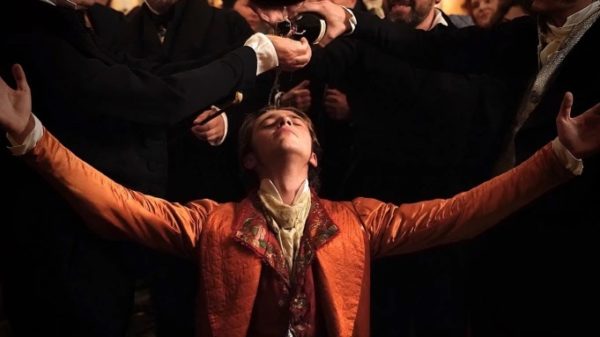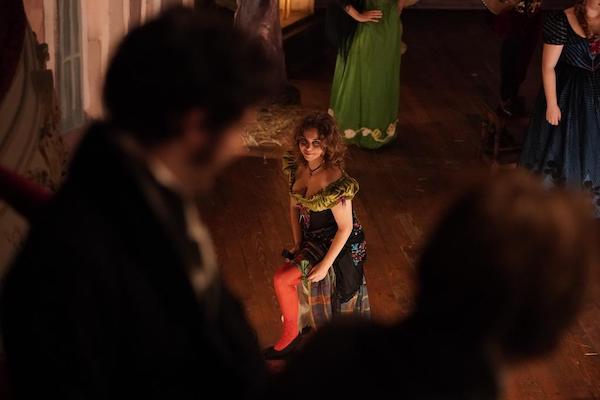Film Review: “Lost Illusions” — 19th Century French Corruption Makes for Thrilling Entertainment
By Erica Abeel
Winner of seven Cesars, this mordant portrait of the corrupt Parisian press mid 19th century, along with the commodification of just about everything, speaks loudly to the internet era.
Lost Illusions, written and directed by Xavier Giannoli. Opening on June 24 at Landmark’s Kendall Square Theatre.

Benjamin Vosin in Lost Illusions. Photo: Roger Arpajou.
In adapting Balzac’s novel Lost Illusions for the screen French director Xavier Giannoli faced a nosegay of challenges. In principle, the works that comprise Balzac’s great Comedie Humaine are less than cinema-friendly. His monomaniacs, so compelling on the page, risk turning cartoonish. Also, Balzac’s habitats are almost demonic, virtual “characters” in the novels — the squalid boarding house of Le Pere Goriot — signifiers of economic and social status. That sort of visual sociology would be lost in translation to the screen.
And will this story of an ambitious arriviste reach across the pond? To the French the name Lucien de Rubempre, poet-protagonist of Lost Illusions, along with Eugene de Rastignac of Goriot, are shorthand for the poor young man who descends from the provinces to conquer Paris, heroes marching under the banner of the little Corsican who became Emperor of France.
Finally, what’s a filmmaker to do with all those moralizing aphorisms Balzac was into?
That said, Lost makes for thrilling entertainment, not least because Giannoli foregrounds themes uncannily resonant today. Winner of seven Cesars, this mordant portrait of the corrupt Parisian press mid 19th century, along with the commodification of just about everything, speaks loudly to the internet era.
Echoing the caffeinated rush of Balzac’s style, Lost roams the period’s opulent drawing rooms, gilded Opera, and theaters frequented by the aristocracy — newly vindicated by the reigning Royalist government. The camera lingers in the raucous dens where what passes for “news” is tailored to reward the highest bidder. The fake news rampant today, anyone — the genuinely fake, that is? Murdoch-style tabloids? The “hedge fund vampire” who bleeds newspapers dry to boost the bottom line? Modern media was already upon us in the 19th century with a commercialized press, spurred by the newly invented printing press and gunning for the biggest profit. “Money was the new royalty, and no one wanted to cut off its head,” the voice-over narrator says.
Lucien (Benjamin Voisin of Francois Ozon’s Summer of ’85) is first sighted working at his family’s printing press in provincial Angouleme (ink will become a recurring visual motif throughout the film). His actual name is Bardon but he prefers de Rubempre, from his aristo mother, since the particle conferred status — and no doubt still does. (Remember, our author became Honore de Balzac). Blond and handsome, with a sensual, hungry mouth, Lucien harbors literary ambitions and is chafing to leave home for bigger things. He’s romantically involved with local saloniste Louise de Bargeton (Cecile de France, dulled down and almost unrecognizable) who admires his flowery poetry. After her husband discovers their affair, the couple flees to Paris.
Lucien hopes to rise through his literary talent. His provincial gaucherie, comically bouffant new coif, and other missteps quickly alienate Louise and her haughty cousin, the Marquise d’Espard (a snaky Jeanne Balibar). One senses the Marquise is also miffed that Lucien doesn’t come on to her. While waiting tables he connects with editor Lousteau (Vincent Lacoste, terrific), a cynical failed playwright. Lucien starts knocking off articles for Lousteau’s newspaper, a rag that traffics in scandals and blithely sells reviews for cash. (That it’s a lefty rag is dispiriting, but French politics is famously byzantine.) “My job is to make the newspaper shareholders rich, and along the way rake it in,” Lousteau tells Lucien.
The newsroom includes a pet monkey that’s prodded to “select” the book to be reviewed. Also paddling in this swamp is an illiterate grocer-turned-press-lord played by Gerard Depardieu, who with each film appears to expand like an accordion. He rejects Lucien’s poetry: “I only publish famous authors. No risk that way.” There’s also Nathan (Xavier Dolan, the noted director) a gifted writer who resists the big sell-out, a counter to Lucien. In Giannoli’s telling these journos are simply gangsters with pens who shoot up careers and fight with inkwells.

A scene featuring Salome Dewaels in Lost Illusions. Photo: Roger Arpajou.
Lucien proves good at the game and his caustic, disingenuous reviews make him a star. Along the way he falls for Coralie (Salome Dewaels) a kept woman and Boulevard actress who aspires to play the tragic heroine Bérénice (referencing Racine’s play, known to every French school kid). Coralie adores Lucien and believes in his (untapped) talent. Their romance forms an oasis of happiness and genuine feeling in a brittle, venal milieu, but their lavish lifestyle and Lucien’s dandified ways incur a whirlwind of debt. When Lucien alienates a royal patron poised to ennoble him, he’s primed for the fall. As Balzac has it, “for all ambitious men their lives unravel unless they’re born rich.”
Across the board the actors are superb. Benjamin Voisin, lovely to look at, makes a persuasive journey from dewy innocent to amoral scammer. As the editor Lousteau, Vincent Lacoste is the film’s scene stealer, playing with the panache of a classically trained actor. Even his smart-ass carriage and curled lip conjure up lithographs by Honoré Daumier. In another casting coup, Salome Dewaels as Coralie evokes the chubby-ish nudes of Renoir.
Lost weaves in fascinating details of the period, such as the elaborate “claques” in theaters paid to support or trash an actress. The film underscores the Balzacian obsession with money, including images of bills of sale with the exact amounts noted. The narrator observes, “You could buy anything, boos, whistles, bravos, rotten tomatoes … At the top of the pyramid, bankers, finance: Laffite, Rothschild, Nucingen.” The voiceovers inject a rancid humor: “Property speculation had extended to graveyards. Even eternal rest came at a price.”
At moments Lost feels like a volley between old school and the current moment. The theme of selling out is a relic, right? But consider that the Cannes Film Festival itself is struggling to preserve its mission to showcase film as art, while navigating a host of competing, less exalted forms of entertainment, the wolf at the door. In one regard, Lost does indeed feel dated. The exposure of corruption no longer alarms, it’s a given. In 1837, when Balzac wrote this masterpiece, his readers would likely have been shocked.
Erica Abeel is a novelist, film and cultural critic, and former professor at CUNY. Her 2016 novel Wild Girls, about three women rebels of the ’50s, was an Oprah Magazine pick. Her journalism has appeared in the New York Times, Indiewire, and other major sites and national publications. A former dancer, when not writing she’s in a Pilates class or at the barre. Her new novel, The Commune, was recently published by Adelaide Books.

After reading Abeel’s review, I would both like to see the movie and hold hands with Abeel in the dark.
speak French and go with her to any movie of her choosing.
Loved the review and her elucidation
Dick Adrian